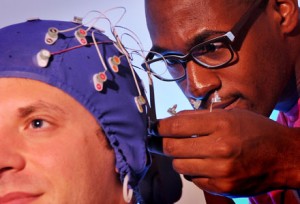Teon Brooks, a member of the NYU Neurolinguistics Lab, looks at the computations involved in recognizing complex words, specifically compound words (words like swan boat, bird house, book award). For semanticists like me, work on compounds by neuroscientists is particularly interesting because compounds are arguably “semantic fossils” (Jackendoff 2002). The kind of compositionality we see in compounds is more rudimentary than the full-fledged compositionally that comes with phrasal syntax, where constituents are headed by functional elements related to voice, aktionsart, aspect, tense, mood, complementizers, definiteness, quantification, and what have you. I would therefore expect the meanings of compounds like swan boat to be computed in a qualitatively different way from the meanings of phrases like boat in the shape of a swan or boat that is inhabited by swans. Is this so? Is there any evidence for this?

